Salma Hayak Septembers of Shiraz
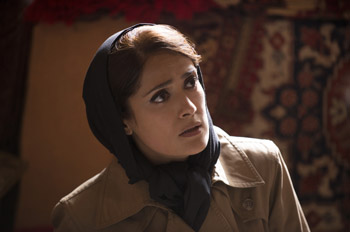
Salma Hayak Septembers of Shiraz
Cast: Salma Hayek, Adrien Brody, Shohreh Aghdashloo
Director: Wayne Blair
Genre: Thriller
Rated: M
Running Time: 110 minutes
Synopsis: Based on the prize winning novel by Dalia Sofer, Wayne Blair (The Sapphires) directs Adrien Brody, Salma Hayak and Shohreh Aghdashloo in a drama inspired by the events of the Iranian revolution. Prior to the Iranian revolution, Tehran was a place where people of all religions were allowed to flourish. Following the fall of the Shah and the rise of the Revolutionary Guard a prosperous Jewish family is faced with the possibility of losing their business, possessions and freedom when the son of their housekeeper reports their bourgeois activites to the increasingly hostile authorities.
Septembers of Shiraz
Release Date: July 7th, 2016
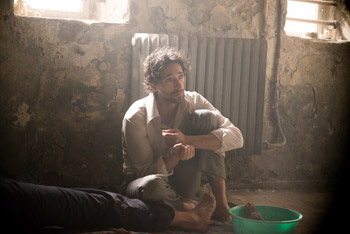 About The Production
About The Production
'Out beyond ideas of wrongdoing and rightdoing, there is a field. I will meet you there." - Jalal ad-Din Rumi, 13th Century Persian Mystic
At once a moving human drama and a timely suspense thriller, Septembers of Shiraz is the story of a family thrust into an unimaginably surreal experience in post-Revolutionary Iran. Their unexpected journey to a new life begins with the arrest of Isaac Amin, a successful jewel dealer and law-abiding citizen accused out of the blue, inexplicably, of being a spy.
Taken to a secret prison, Isaac's life unravels overnight but the effects resonate equally through his stunned family, left behind to figure out what has happened to them in an atmosphere of sweeping change and fear. As Isaac's wife defiantly searches for a way out -- and as Isaac searches to understand his sudden reversal of fate – they each must confront who they are, where they come from and what the future holds…even as events build to an incalculably dangerous attempt to escape tyranny.
Amidst high-wire tension and provocative questions about privilege, justice, loyalty and family, the film is a portrait of choices made, futures considered and the renewing power of love.
Based on the acclaimed best-seller by Dalia Sofer, the Amin family's stirring story of survival comes to the screen directed by rising Australian director Wayne Blair, whose 2012 film, The Sapphires, garnered the Australian Film Institute's Oscar® equivalent for Best Picture. Academy Award® winner Adrien Brody (The Pianist, The Grand Budapest Hotel) and Academy Award® nominees Salma Hayek (Frida, '30 Rock") and Shohreh Aghdashloo (House of Sand and Fog, Rosewater) head an international cast who united around this powerful story.
Millennium Films presents Septembers of Shiraz directed by Wayne Blair from a screenplay by Hanna Weg based on novel by Dalia Sofer. The producers are Gerard Butler, Danielle Robinson, Heidi Jo Merkel, Alan Siegel and Hanna Weg. The accomplished behind-the scenes team includes editor John Scott (Sexy Beast, Rabbit Proof Fence, The Quiet American), cinematographer Warwick Thornton (The Sapphires), production designer Anne Beauchamp (Adoration and Goddess), costume designer Irina Kotcheva (Getaway) and Academy Award® nominated composer Mark Isham.
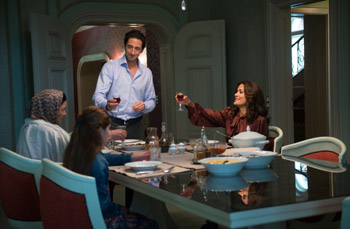 A Family Caught In Tyranny
A Family Caught In Tyranny
In 1979, fundamentalist rebels overthrew the Shah of Iran – and simultaneously, threw the everyday lives of many into total disarray. In the West, it was an event captured in incendiary news clips of fevered young revolutionaries, American hostages, mounting repression and political tensions that exist to this day. But the story that was rarely told, and almost impossible to see from the outside, is what happened afterwards inside Iran to ordinary families – who, to their dismay, found their own intimate lives and relationships unexpectedly entwined with a new totalitarian reality in perilous ways.
In the wake of the Revolution, life went on -- but nothing was the same and the nation remained divided. Some were filled with hope for a more fair and moral society, yet others were now castigated for having been part of the Shah's decadence and many who had never been political at all became state enemies overnight because of their religion, values or lifestyles. Arrests, raids and purges became the norm among the wealthy and former cultural elites. Forging an atmosphere of mounting fear, thousands of executions took place between 1979 and 1982, often based on vague charges of corruption or, among Iran's once-thriving Jewish community, charges of spying for Israel.
Identities became blurred, families collapsed and betrayals were set in motion. Amidst the turmoil, some were confronted with life's hardest questions: Who am I? How has my life impacted others? What do I stand for now? And which things still matter when you've lost nearly all you had?
It took a couple of decades, and a coming of age of a new generation, but slowly, a series of moving, revealing stories from behind the secretive new veil of Iran began to emerge.
Among the most powerful was Dalia Sofer's 2007 novel The Septembers of Shiraz –which drew instant acclaim as a luminous yet grippingly suspenseful debut and was chosen as one of the New York Times' Most Notable Books of the Year.
Dalia Sofer, who was born in Iran and fled with her family to New York at the age of 11, introduced readers to an unforgettable family: the prosperous, Jewish Amins, who thrived in Tehran until one day in 1981, when their whole reality changed abruptly.
When Isaac Amin is suddenly snatched from the family home by police with no warning, it creates profound dilemmas for everyone in the family. Isaac faces harrowing interrogations that force him to confront his life in ways he never has before. His wife Farnaz must re-examine her failing marriage, and her increasingly fraught relationship with the family's Revolution-supporting maid, Habibeh, even as she tries to wrangle Isaac's release. Even their 12 year-old daughter Shirin takes desperate risks to save their family. But each comes to the same realisation: that their only chance for a future is to risk everything for each other.
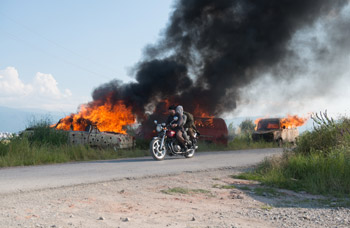 The book riveted many with its compassionate portrait of Iranians from all walks of life – rich and poor, religious and secular, the persecuted and their persecutors, those who stayed and those who risked their lives to flee.
The book riveted many with its compassionate portrait of Iranians from all walks of life – rich and poor, religious and secular, the persecuted and their persecutors, those who stayed and those who risked their lives to flee.
Among those who could not put it down were producing partners Gerard Butler and Alan Siegel, who were immediately moved to seek out the rights. It wasn't a slam dunk. When Alan Siegel called Dalia Sofer, she told him the story was so intensely personal to her, she wasn't sure she could bear to give the story to a filmmaker. 'So I flew to New York, took her out for drinks and told her people need to know this story," recalls Alan Siegel. 'From that moment on, it was a labor of love."
For Alan Siegel, the story is acutely relevant to our volatile times. 'This is a story about people who had it all, but when things change, they have to ask: what is really important to us? There aren't that many truthful dramas and thrillers around that people can relate to, few that give you this kind of deep emotional experience at the same time as telling a vital story."
Gerard Butler and Alan Siegel also brought in their partner Danielle Robinson. She too felt an instant connection with a story she sees as being about the grounding power of family even when everything else is falling apart. 'It's about the idea that even under repression, love and family can hold people together," Danielle Robinson says. 'It's a beautiful part of this story that family is the way the Amins survive this incredibly challenging time. Iran will always hold a place in their hearts. But as they try to escape, they realize it's not about materialistic things and it's not about who they were in Iran anymore. It's about who they are inside as a family – and the love and strength that they have."
Gerard Butler, Alan Siegel and Danielle Robinson would later join up with producer Heidi Jo Merkel, who was equally moved by the story. 'When I went to Berkeley I had a roommate in college who escaped Iran with her family - her father was a colonel under the Shah. And that was so eye opening.
Obviously I'd learned about the Revolution, and knew some of the history, but when you encounter the personal side of that story, and when you see how real people were affected, it's very powerful," she observes. Merkel was also strongly lured by the film's portrait not just of a man imprisoned, but a woman trying to rescue her husband and her whole sense of the order of life. 'I tend to be very drawn to strong female protagonists in the films I produce, and I love that Isaac's wife, Farnaz, is this amazing pillar of strength in the film," she says. 'For all of the Amins, it comes down to realizing, at the end of the day, if you have your life and your freedom, that's what matters; not all the trappings of society. It's something that really speaks to things that are going on all over the world today, in too many countries where repression is on-going."
To bring both the reality and the spirit of Dalia Sofer's novel to life on screen, the producers turned to an intriguing, rising pair of cinematic storytellers: screenwriter Hanna Weg, known for her intelligence and humanism, and director Wayne Blair, the native Australian who came to the fore with the winning musical The Sapphires, based on the true story of a 1960s all-girl soul group started by four young Aboriginal Australian talents.
Adapting Dalia Sofer's novel came with a slew of challenges that Weg thrived upon. At 400 pages long, condensing it was a necessity to bring it to the screen, but she says the process was a pleasure.
'The book was so beautifully crafted, and each character so beautifully developed with such individual voices, my job really was just to hone in on the essence," she says. 'And I always felt this was a story about a family, a family coming together in the midst of crisis. This event could have split the family, it could have even ended the family. But they came together and that is a story to which I think anyone will relate."
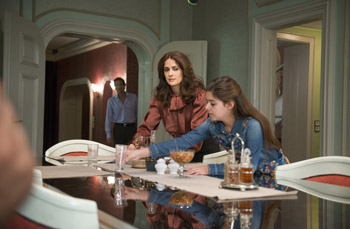 Weg also wanted to highlight the way people from different classes shifted perspectives in this time – both at home and in the political realm - through two very different relationships. 'First, you have Farnaz and Habibeh, a wealthy wife and a housekeeper of completely different classes who are thrown together in this situation. They have intimate knowledge of each other's lives in a way but they are not intimate, they are not family, they are employer and employee.
Weg also wanted to highlight the way people from different classes shifted perspectives in this time – both at home and in the political realm - through two very different relationships. 'First, you have Farnaz and Habibeh, a wealthy wife and a housekeeper of completely different classes who are thrown together in this situation. They have intimate knowledge of each other's lives in a way but they are not intimate, they are not family, they are employer and employee.
There is always something difficult on both sides about that, a lot of conflicting emotions," she says. 'And then you have Isaac and Mohsen, the tortured and the torturer. I really like that Mohsen represents a much more complex, more real approach to what it means to have been tortured and then in turn to torture. He's utterly human and that makes for a human connection with Isaac." There were reams of resources to draw on – and Weg did extensive homework and historical exploration into post-Revolutionary Iran – but she says the book was always her touchstone.
'I did a lot of research," Weg says, 'but because Dalia Sofer had actually gone through this experience, I always felt it was her novel that could give me the deepest understanding and all the details that I could never have personally known. This story comes from inside her and you can feel that."
The mix of familial intimacy and epic societal change in Weg's script appealed to Wayne Blair, who as an actor, writer and director of both theatre and film, has rapidly become known for his wide-ranging versatility – and also for striking a very human chord with his work. Wayne Blair sees Septembers of Shiraz as a story of how people, in any time and place, face dizzying transitions. To me it's really about who this family becomes by the end of the film," he says.
'It's not only about Iran, but about who we are as human beings. What was interesting to me is the way the Iranian Revolution becomes a catalyst that brings together this family."
He also loved having the chance to dive into a starkly different reality from his own. 'This project was really a journey for me," he notes. 'I've learned so much about this period and how much Iran changed in that short space of time and how that led to where things are now. It's a story that has a lot of ramifications, that opens up a whole Pandora's box for everyone. And I've since met many people who have their own individual stories, close to the Amin family's, to but with their personal variations. You wish you could represent all these stories because each one is incredible."
That wish become a commitment to bringing the Amins to life on screen as fully and richly as possible. 'I always saw it as a story of family," Wayne Blair concludes. 'It's the story of how a family has to sacrifice to truly find themselves."
Many who saw The Sapphires wondered how the same man could transport himself from the joys of an Aboriginal all-girl band into the dark claustrophobia of an Iranian prison – but Wayne Blair convinced them all with his own distinctive approach.
Recalls Alon Aboutboul, who plays the masked interrogator Mohsen: 'After watching The Sapphires, I said -Wayne Blair, what are you going to do? How are you going to direct Septembers of Shiraz? You're all love.' But then I realised, that this movie was going to be about love. That's how Wayne Blair always saw it."
The Accused: Adrien Brody on Isaac Amin
The role of Isaac Amin is that of a man not only fighting for his life and his freedom, but also trying to figure out who he is now that everything has been stripped from him. The intensity and complexity of the part demanded an actor of both fearlessness and range – and the filmmakers of Septembers of Shiraz were exhilarated when Academy Award® winner Adrien Brody stepped in.
The performance that Adrien Brody gives in this film is mesmerizing," says producer Alan Siegel. 'The arc that this character makes 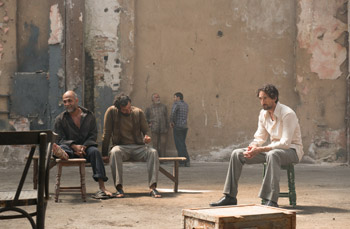 just threw me for a loop. It's a very emotional experience."
just threw me for a loop. It's a very emotional experience."
Adrien Brody came to the fore in the harrowing lead role of Roman Polanski's The Pianist, portraying Polish composer Wladyslaw Szpilman, who narrowly escaped the death camps and survived the Nazi occupation of Warsaw in hiding. The role garnered the Academy Award for Best Actor, with Adrien Brody becoming the youngest person to ever receive the honour. He has gone on to an extremely broad span of roles, most recently taking a comic turn in Wes Anderson's acclaimed Grand Budapest Hotel and playing Houdini on television.
Septembers of Shiraz drew him in. 'The novel Dalia Sofer wrote and Hanna Weg's script were just great dramatic material. It's a story delves into the hardships that people faced at that time in Iran and the repression that exists across the world. But at the same time, it's a beautiful story, and a compelling story, that sheds light on many issues," he says. 'Even though this story is set in the Iran of 1981, I think it speaks to our times and to the universal need to never take the present for granted and to always be conscious, on a worldwide level, of human rights violations." Adrien Brody's mother (the photographer Sylvia Plachy) was herself a refugee, who fled Hungary, which has given him an intense compassion for the world's displaced people. 'She and her family left everything behind and fled in the back of a pickup truck. They ended up in Vienna and then finally in the States, but I know that sense of loss is very hard to let go of," he says. 'Not just a sense of loss but a sense of how precarious things are in the world. And interestingly enough, that's something I've always been interested in my own work."
He was also drawn to the deep challenge of immersing himself in Isaac's experience – despite knowing in advance it would take him to some chilling places. 'I find these kinds of films more fulfilling, a more lasting experience," he says of his attraction to intense dramas. 'It can be very difficult on a daily basis to be connecting physically, emotionally and psychologically to suffering.
But I'm always interested in tapping into that truthfully and conveying it in accessible ways to audiences. I've been doing this long enough that I feel safe to go as far as possible." Adrien Brody went through intensive preparation trying to get underneath Isaac's skin and into the intense experience he's undergoing. He met with survivors of Iran's prisons. He lost weight.
And as production approached, he isolated himself more and more to emulate Isaac's situation in prison. One of the first things Adrien Brody contemplated was why the Amins stay in Iran after the Revolution. It's a pretty natural thing to understand," he points out. 'Isaac's wife, Farnaz is very attached to keeping the life that they've built - not just the material gains, but the friendships, the comforts of home, their affection for their homeland. I think it's a huge thing to make the leap from seeing upheaval on the news to realizing that change is happening to your family and that you have to make a shift and move, and start all over again. I can see how you might miss the boat. I can see how lots of people procrastinate. You know, even when the tsunami's coming and you hear the warning you can think, -oh, it's not going to affect me.'"
He also spent a lot of time thinking about the back-and-forth, and the haunting communion, that develops between Isaac and his interrogator Mohsen, which becomes a kind of meeting of two very different minds – with huge stakes for both.
'There is a very interesting dynamic at work between them. There's a lot of chess being played," Adrien Brody observes. 'There are so many layers there. There's a huge class difference that has bred resentment. There's some anti-Semitism that was prevalent. But with Mohsen, I think it's also just that has this desire for the beautiful life that Isaac seems to have. At the same time, I think Isaac has harboured this illusion that his money can buy some freedom. So, he's having an awakening that the financial success and the big house and all of those trappings are meaningless. He's realising the true things that he values are his family, their freedom and lives. He's wiling to trade everything he has for that."
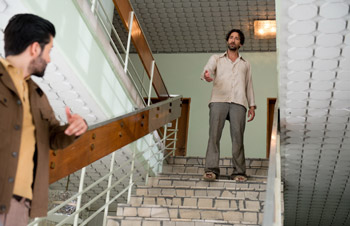 Adrien Brody continues: 'So in a way they trade positions, but I think Isaac's growth and awareness is profound."
Adrien Brody continues: 'So in a way they trade positions, but I think Isaac's growth and awareness is profound."
An equally complex relationship exists between Isaac and Farnaz; and yet it is the dream of reuniting with Farnaz that helps to keep him going in prison. 'Isaac and Farnaz have experienced the usual complications of married life," Adrien Brody comments. 'They have their problems going on in the house and there was an affair – but what's interesting is that for Isaac, it's all kind of washed clean because their love and their bond become what matters. And when they're reunited it's so beautiful."
Throughout the process of diving into the depths of Isaac, Adrien Brody worked closely with Wayne Blair. 'Adrien Brody and I looked at the character in detail, and then we threw all that detail out the window, in order to make it real in the here-and-now. It was a really good process," says Blair.
'Wayne Blair comes from an acting background. He understands acting. And he's very considerate about the process and the need for the right atmosphere to build focus," says Adrien Brody.
Though Adrien Brody acknowledges that playing Isaac seared him in a sense, he says it also brought him many rewards. 'It's a kind of knowledge you glean from these roles," he suggests. 'It has made me a more introspective and grateful person. I think there's a need to tell these stories about the past.
We can learn a lot from our past if we're conscious of it, and through empathy for other people in other cultures. That's why it's important to make films like this." Adrien Brody's commitment was palpable in every nuance of his performance. Sums up Danielle Robinson: 'Adrien Brody seemed to carry the soulfulness of Isaac in every breath that he took. He was mesmerising to watch."
On The Homefront: Salma Hayek as Farnaz
As Isaac Amin fights for his life in prison, his wife, Farnaz, has a more complicated journey, attempting to find her missing husband, all while confronting the rifts in their marriage, the changes in her homeland and the family's new situation living at the edge of danger and uncertainty. To take the role the filmmaker chose Salma Hayek, who garnered an Academy Award® nomination for her stirring portrait of the boldly influential artist Frida Kahlo and often portrays willful, independent-minded women. 'Salma is such a terrific actor and she brings an intensity to Farnaz," says Alan Siegel. 'She brings a real presence of strength to the movie."
For Hayek, Farnaz's dilemmas were compelling to explore. 'She's a woman who has fought her whole life to have the perfect family. And now she has a wonderful husband and a boy and a girl.
They have love, wealth, many friends, and an important place in Iranian society. Only now, she sees everything that she worked so hard to accomplish in her life crumbling to pieces," she observes.
Salma Hayek continues: 'What really moved me about Farnaz is that I think she's representative of so many unsung women in the world – women in different political and social situations – who, in times of trouble, have held their families together. Women may not always have a visible role in history but they often have taken on the vital job of keeping humanity more humane."
As soon as she took the role, Salma Hayek threw herself into research and met with many women who faced similarly harrowing circumstances to the fictional Farnaz. 'I was very fortunate to come across some very interesting women who also had to leave Iran," she says. 'I did a lot of research and I also learned to speak with a Farsi accent. I had a lot of support from some of the Iranian cast – and specially Shohreh [Aghdashloo], who also lived this conflict and fled Iran exactly in this time period. She helped me so much with many things, including the accent."
On the set, she felt an immediate rapport with Adrien Brody that also deepened her emotions. 'I cannot think of anyone else could have played Isaac," she says. 'We had such good communication together – and I'm very proud of the marriage that we have created in the film. Adrien Brody is incredibly smart and his choices are always very brave, so I think we were able to bring something fresh to this portrait of a couple in turmoil."
Perhaps even beyond the bond between Farnaz and Isaac, the most important relationship Hayek needed to penetrate was that between Farnaz and the family housekeeper, Habibeh, played by Aghdashloo. 'I think this is a relationship – between a working maid and the woman of the house - that many women are going to find very interesting," she says. 'Sometimes you have a housekeeper who becomes like a part of your family. And yet, there's a separation between you, because you come from such very different circumstances. This is the case for Farnaz and Habibeh. Theirs is a very complicated, yet at times beautiful, relationship."
She loved having the chance to work Aghdashloo. 'Shohreh's inspiring to watch. There's something about her that shines. She is so 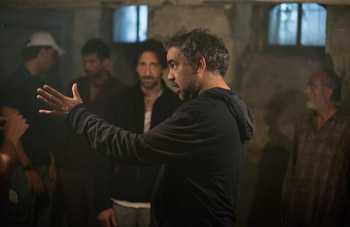 connected to her emotions and she's been a mentor throughout this process in many different ways. On set, we found an amazing chemistry together. I felt sad every time we finished a scene because we could have kept going again and again, always finding new ways. Some actors don't even talk before the scene. But with Shohreh, we said so many things to each other, sometimes just with the eyes. I really felt a connection to her and Habibeh."
connected to her emotions and she's been a mentor throughout this process in many different ways. On set, we found an amazing chemistry together. I felt sad every time we finished a scene because we could have kept going again and again, always finding new ways. Some actors don't even talk before the scene. But with Shohreh, we said so many things to each other, sometimes just with the eyes. I really felt a connection to her and Habibeh."
Hayek was appreciative of how Wayne Blair kept all these different, conflicted connections in the air at the same time. 'He's an actor himself and that helps," she observes. 'He's meticulous but he's also kind and understanding and he makes you feel safe because of this. You could really feel how important this story was to him."
Blair in turn was exhilarated to work with Hayek. 'Every day, she came to set with ideas," he recalls. 'She is a big believer in a lot of discussion and we conversed daily about Farnaz. It was constant discussion about the details of the story, and I felt blessed to have an actor of that caliber."
Mirror Images: Habibeh and Mohsen
The filmmakers of Septembers of Shiraz were especially pleased to be able to cast Shohreh Aghdashloo, who was born in Tehran and became a leading actress there before leaving for the U.K. after the Iranian Revolution. In England, she earned a degree in International Relations prior to resuming her acting career. In 2003, she garnered an Academy Award® nomination for her role as devoted wife and mother in House of Sand and Fog and in 2008 won an Emmy for her turn as Saddam Hussein's wife in HBO's House of Saddam. Most recently, she appeared in Jon Stewart's debut feature film, Rosewater, which is also set in Iran.
'Shohreh Aghdashloo brings such gravitas and wisdom to this role," says Wayne Blair. Adds Heidi Jo Merkel: 'You couldn't have two more iconoclastic actresses than Salma Hayak and Shohreh Aghdashloo in these roles. Together, they so beautifully portray the strife going on between these two women and their contrasting ideologies. I think they felt very blessed to have a chance to work with each other and these characters."
For Shohreh Aghdashloo, the role was an intensely personal journey, allowing her to look into the life of countrywoman who had a different background and made different choices. 'I love this character," the actress says. 'She's very close to my heart, and it's as though I've known her all my life. Obviously when I was living in Iran I came across people like Habibeh, but I never truly understood what they stood for until this movie."
Shohreh Aghdashloo, however, was well aware of the mood in Iran at that time, having lived through it herself. 'It was a time of confusion, misconception, lies and rumors," she recalls. 'In fact, rumours became the main source of information in the absence of true media."
Habibeh is caught up in that confusion and torn in her heart between her hope for real change and her allegiance to the Amin family. 'Habibeh's been working for Farnaz for almost 20 years," notes Shohreh Aghdashloo. 'She loves Farnaz and does everything for her. But Habibeh also wants to stand for her rights at the same time that she is trying to be loyal to her mistress. She's also trying to find out her place in this new society. Her son is joining the Revolutionary Guard, and she hears all this stuff on the radio, the Ayatollah's speeches, and she starts questioning herself and her situation. I give her the benefit of the doubt that she is trying to do the right thing, even if she is confused."
For Shohreh Aghdashloo, the relevance of Septembers of Shiraz remains acute. 'Way before the Arab Spring, there was supposed to be an Iranian Spring in 1979," she points out. 'Iranian people believed Ayatollah Khomeini was going to become their Gandhi, but time and history proved them wrong. What was once a safe haven for people from different religions, beliefs and ideologies, turned into a state of one religion only. No way but my way. As a result, thousands of innocent people, were killed, tortured, or had to leave their homes and their beloveds behind to save their lives."
She goes on: 'It is still happening as we're speaking, on a daily basis: thousands of people are trying to leave their homelands. Look what's happening in Syria right now – innocent women, children and grandparents are all trying to sneak out of their own homeland, like smugglers.
They're leaving at night with just a few belongings in the hope of a better life somewhere else." While the themes of Septembers of Shiraz hit home in the most powerful way for Shohreh Aghdashloo, there were also great joys in the production. 'I had a blast working with our director Wayne Blair," she says. 'He is truly an actor's director, with an eye for details. And I enjoyed myself so much working with Salma Hayak. She is an amazing actress, a beautiful friend and a true humanitarian."
One of the most unusual of many compelling relationships in Septembers of Shiraz is that between Isaac Amin and his masked prison interrogator, Mohsen – two men who have quite literally switched places. Overnight it seems the once confident and well-off Isaac has lost all power, while the once marginalised and tormented Mohsen has gained an authority he never had before. Yet, in their sometimes brutal, often revealing, conversations, both make an unexpected human connection. Taking the role of Mohsen is Alon Aboutboul, who has been seen in The Dark Knight Rises and Body of Lies. Blair saw an immediate chemistry between Aboutboul and Adrien Brody that captured him. 'He and Adrien fit really well together. They have to be at loggerheads for 95% of the film, yet then come to a kind of tacit understanding -- and that is a challenging relationship," says the director. 'Alon Aboutboul is someone who works really hard, who is very interested in a lot of detail, and really, there's no one else quite like him."
Alon Aboutboul was fascinated by Mohsen's shifting encounter with Isaac. 'Before the Iranian Revolution, before he became an interrogator himself, he was tortured and imprisoned by the SAVAK, the Shah's secret police. So he's a person who has been in hell, got out of it somehow, and now he's doing the same thing that's been done to him," he explains. 'But when he meets Isaac, he encounters an incredible human being. And the relationship between the two men blurs into something where you almost don't know who is free and who is imprisoned."
The challenges Alon Aboutboul faced were considerable – digging into a torturer's soul, performing a large portion of his role eclipsed behind a mask – but he says he trusted Wayne Blair instinctively and implicitly. 'When I met Wayne Blair, it took me one minute to look at him. I saw his eyes and immediately I said, -whatever you want, sir. I'm with you,'" he recalls.
Never allowing himself to see his character as a villain or a trope, Alon Aboutboul thought a lot about who Mohsen was and how he allowed himself to take on the cruel role he once despised. 'I think he is as an idealist, a Muslim who believes in the cause, who believes he is part of changing the world for the better," he observes. 'But I think by the end of the movie, he better understands that idealism can also lead to destruction. Mohsen is fed up with the way life was. He was born into a harsh reality, and he never had money, and he sees a chance to change that. '
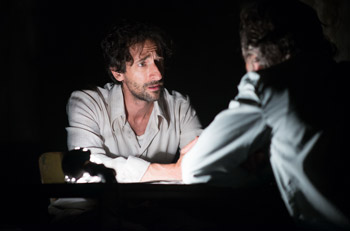 He also kept enough openness in Mohsen to allow for him to be touched by something in Isaac, even if just at the edges. 'In the middle of the story, Mohsen sheds his mask because he can't stand it anymore," Alon Aboutboul comments. 'He can't stand that he is like a mirror and he's getting reflected back an image of someone who is proud and full of love."
He also kept enough openness in Mohsen to allow for him to be touched by something in Isaac, even if just at the edges. 'In the middle of the story, Mohsen sheds his mask because he can't stand it anymore," Alon Aboutboul comments. 'He can't stand that he is like a mirror and he's getting reflected back an image of someone who is proud and full of love."
The link between the two, Alon Aboutboul notes, also emerged from the power of Adrien Brody's performance. 'It's incredible working with an actor with the skill of Adrien," he says. 'It's like you know his insides and he knows yours. It was a profound, joyful, exhilarating experience," he summarises. Also playing a key role in the film is Ariana Molkara, the 11 year-old newcomer who takes the role of the Amin's school-age daughter, Shirin, whose childhood games turn to the stuff of spycraft after her father's arrest. Ariana Molkara, who makes her debut in the film, immediately related to Shirin's feelings of defiance and hope in the face of her father's incomprehensible imprisonment.
'I think she's very strong and brave and emotional during this time when her father's been taken away," she says. 'Basically, her whole world is just falling apart in front of her eyes. But she's a risk taker – and what I love about Shirin the most is that, even in times of hardship, she doesn't let anything get in the way of her protecting her family."
While Ariana Molkara has never been to Iran, she loved learning about life in another culture. 'It took me a while to get used to the kind of lifestyle Shirin lives," she admits. 'But the more I talked to Dalia and Hanna about her, I found myself really able to imagine being in her shoes."
Uncovering Tehran: The Film's Design
Filming the story of Septembers of Shiraz posed an immediate challenge. After all, it would be absolutely impossible in the world today to shoot in Tehran, the city where these events took place, but which remains under the iron rule of a powerful theocracy. At the same time, it was essential to capture the atmosphere of a populace undergoing immense changes in every corner of the metropolis. This situation took the production to Bulgaria, where a wide variety of locations, talented crews and the Nu Boyana Studios made the re-creation of a tumultuous Iran in 1981 possible.
To forge the full atmosphere of Iran at that time – that of a country steeped in rich traditions and culture at its core, but becoming increasingly totalitarian -- Wayne Blair pulled together an accomplished team headed by cinematographer Warwick Thornton, with whom he worked on The Sapphires, along with production designer Anne Beauchamp and costume designer Irina Ketchova. Thornton, winner of the Cannes Camera D'Or for his 2009 film Samson and Delilah, was riveted by the material. 'I absolutely loved the script," he says. 'And what I loved is that it doesn't really take a side. Rather, it's about human beings and how some become persecuted and others become persecutors, and the audience gets to decide why people do what they do and who is right and who is wrong."
He and Wayne Blair knew that it was essential that the look of the film be believable, and also reveal subtle emotional changes that lead to the suspenseful climax. They chose to shoot 90% of the film hand-held, using the leading-edge digital Arri ALEXA cameras. Then, they honed in on a style that emphasises immediate, direct engagement – one that took both Wayne Blair and Warwick Thornton into exhilarating creative territory.
'Wayne Blair and I talked about the idea that we wanted the film to feel less like we were creating moments and more like we were just capturing something real. We wanted it to feel almost like the camera was just there at the right time -- almost like a documentary yet not a documentary. And that became a really interesting dynamic for me. It became exciting," Warwick Thornton recalls.
He continues: 'We also wanted a kind of beautiful hand-held photography, where the audience really serves as the tripod. The aim was for something very stable and succinct but where the camera can move with the characters and the action at any moment." Warwick Thornton also wanted to move with ease between the two very different sides of Tehran: the wealthier northern part of the city which is home to the Amins and the more impoverished south, where many workers such as Habibeh live. 'We were careful not to create vastly different worlds, but just subtle differences, where you know you are in the same city, in the same era, but perhaps in slightly different realities," he explains.
Lighting became another expressive tool for Warwick Thornton. 'As the film starts you have this very successful family but then their lives start really falling to pieces. Well, so does the lighting, in a sense. We start off in the opening scenes using a lot of lighting but then things progress to where things for Isaac get to rock bottom and then, we're using just a single light," he comments. Throughout, it was a joy for Thornton to reunite with Wayne Blair. 'He really pushes you to think outside the usual cinematographer's square. There are very few directors who can do that, but when you work with him, you find yourself offering up the most creative shots," he observes.
The rest of the team worked in close collaboration. 'With the design that Annie did and with Irina's costumes and with Wayne and the actors, I had such a great experience," Warwick Thornton concludes. 'It was an incredible journey and also one filled with amazing performances. I cried a few times after shooting some of the scenes. I think we all felt a responsibility to be true to the times and to the people who have gone through these experiences."
Production designer Annie Beauchamp felt that same responsibility. She began her work with an extensive trip into the historical archives. 'We look at so much footage, numerous documentaries, loads of journalists' photographs and everything we could find from the period. We really felt there was a weight to this story that demanded respect," she explains. 'But throughout it all, I also kept Dalia Sofer's novel always on my desk, and every day I looked at it to remind me the importance of staying true to the story she wrote."
Though she could not tour Tehran, Beauchamp familiarised herself with every corner of the city. She knew exactly where the Amins lived. 'A marble arch divided Tehran between north and south and the Amins lived in the north in an area that was very upper middle class. On the other side of the marble arch is the south, an area that has a more raw quality and where the unrest that started the Revolution was more palpable," she explains. 'Throughout, we wanted to really emphasise the shifts, not only between neighbourhoods, but between prison, street life and family life inside the houses."
Copious details were pulled from the research. 'We looked at street signs, graffiti, graphics, posters, created our own Revolutionary street kit," Tehran Beauchamp describes. 'And we had brilliant Iranian consultants, including former prisoners, who really helped us to create the feeling of being inside."
The Amin house was a key location. 'I think a family's house, and all its trappings, all its memories is often what holds people in a 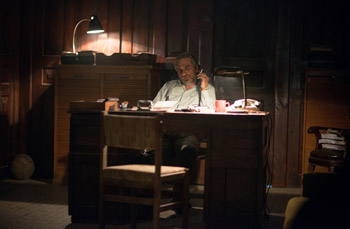 place even when they know they might be in danger," the production designer comments. 'The house is really about Isaac and Farnaz. Farnaz's personal belongings speak to what has meaning to her; and you can see how Isaac's aesthetic as a jeweler has been influenced by fine art, poetry and architecture. The house had to reflect them, but at the same time what I love so much about the story is that by the end of the story, the house has less importance. They realise that, as comforting and beautiful as their material possessions are, they are not what has the greatest value to them."
place even when they know they might be in danger," the production designer comments. 'The house is really about Isaac and Farnaz. Farnaz's personal belongings speak to what has meaning to her; and you can see how Isaac's aesthetic as a jeweler has been influenced by fine art, poetry and architecture. The house had to reflect them, but at the same time what I love so much about the story is that by the end of the story, the house has less importance. They realise that, as comforting and beautiful as their material possessions are, they are not what has the greatest value to them."
Tehran Beauchamp worked thematically with glass, mirrors and reflections to echo the story's probing into identity. 'You have the crystal ashtray thrown at the TV, the shattering of the glass at Isaac and Farnaz's wedding and the Shah's chandelier – it's a design undercurrent throughout," she points out.
She, too, found herself inspired by Warwick Thornton's lighting. 'There's so much lovely play with light, so many textures and patinas," she observes. 'In the interrogation room, Warwick and I came up with this idea of using an industrial garage light – and there was such simplicity in that, yet it created just the right atmosphere. It was a pleasure working with him."
Though it was her first time working there, Beauchamp immediately felt at home in Bulgaria. 'It was terrific, the studio setup is incredible and I was able to use a really brilliant art team," she summarises. 'There's a professionalism and resourcefulness there that you don't get often in other places."
Wayne Blair was gratified by the commitment of the entire team in Bulgaria, and they in turn were committed to his vision of what Septembers of Shiraz could become. 'Wayne has a deep understanding of the world," sums up Alan Siegel. 'He understands emotions. He understands people. He understands what life is all about. You might not have imagined him directing this movie because he comes from a different culture, but he understood the essence, the spirit. And he's also an amazing actor who relates to actors so well and they love working for him. He was the perfect storyteller for this."
For Alan Siegel, whose initial love of Dalia Sofer's novel set everything in motion, seeing it all come to life on screen was a stirring experience.
'Seven years ago, I was trying to get the rights to this movie and in that time this has become my greatest movie experience ever," he concludes. 'We had a remarkable cast of Oscar® winners and nominees, we had a terrifically creative crew, and the most thrilling thing of all is seeing that the dream Gerry and I had in the very beginning – to bring Dalia's very important and moving story to the world – has become a reality."
Septembers of Shiraz
Release Date: July 7th, 2016
Have You Seen This?
MORE
- Mission: Impossible Fallout
- Glenn Close The Wife
- Allison Chhorn Stanley's Mouth Interview
- Benicio Del Toro Sicario: Day of the Soldado
- Dame Judi Dench Tea With The Dames
- Sandra Bullock Ocean's 8
- Chris Pratt Jurassic World: Fallen Kingdom
- Claudia Sangiorgi Dalimore and Michelle Grace...
- Rachel McAdams Disobedience Interview
- Sebastián Lelio and Alessandro Nivola...
- Perri Cummings Trench Interview




